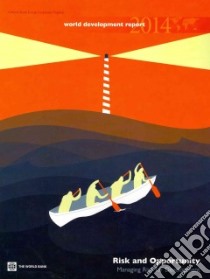- Libreria
- >
- Libri in lingua
- >
- Economia, finanza e management
- >
- Economia dello sviluppo
World Development Report 2014 - 9780821399033
Un libro in lingua di World Bank (COR) edito da World Bank, 2013
- € 35.20
- Il prezzo è variabile in funzione del cambio della valuta d’origine
The last 25 years have witnessed unprecedented changes around the world—many of them for the better. In all continents, numerous countries have embarked on a path of international integration, economic reform, technological modernization, and democratic participation. As result, economies that had been stagnant for decades are growing, people who had suffered deprivation for generations are escaping poverty, and hundreds of millions are enjoying the benefits of improved living standards and scientific and cultural sharing across nations. As the world changes, a host of opportunities arise constantly. With them, however, old and new risks appear, from the possibility of job loss and disease to the potential for social unrest and environmental damage. If ignored, these risks can turn into crises that reverse hard-fought gains and endanger the social and economic reforms that produced these gains. The World Development Report 2014, Managing Risk for Development, contends that the solution is not to reject the changes that bring about opportunities along with risks, but to prepare for them in a proactive and holistic way. Thus, managing risks responsibly and effectively has the potential to bring about a sense of security and means of progress to people in developing countries and beyond. Although individuals’ initiative and responsibility are essential for managing risk, their success can only be limited without a supportive social environment, especially when risks are large or systemic in nature. The WDR 2014 argues that a way in which people can successfully confront risks and opportunities that are beyond their means is to share their risk management with others. This can be done through naturally occurring social and economic systems that enable people to overcome the obstacles that individuals and groups suffer from, including lack of resources and information, cognitive and behavioral failures, missing markets and public goods, and social externalities and exclusion. These systems –from the household and the community to the state and the international community—have the potential to support people’s risk management in different yet complementary ways. The WDR 2014 presents a detailed approach and specific advice to improve resilience. For policy makers in developing (and developed) countries, the Report also provides strategic recommendations that cut across risks and social systems in an integrated framework. They attempt to provide both innovative solutions to long-standing problems in poor and emerging economies and ways to mainstream risk management into the development agenda. These recommendations should serve to guide the dialogue, operations, and contributions from key development actors –from civil society and national governments to the donor community and international development organizations.
Informazioni bibliografiche
- Titolo del Libro in lingua: World Development Report 2014
- Sottotitolo: Risk and Opportunity: Managing Risk for Development
- Lingua: English
- Autore: World Bank (COR)
- Editore: World Bank
- Collana: World Bank (Paperback)
- Data di Pubblicazione: 07 Ottobre '13
- Genere: BUSINESS and ECONOMICS
- Pagine: 343
- ISBN-10: 0821399039
- EAN-13: 9780821399033


